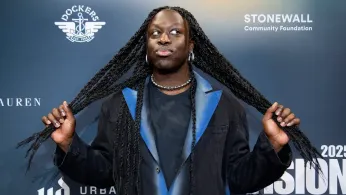
6 hours ago
Bob the Drag Queen Condemns Treatment of Isis King on 'America’s Next Top Model'
READ TIME: 2 MIN.
RuPaul’s Drag Race season 8 winner Bob the Drag Queen has drawn renewed attention to a pivotal moment in LGBTQ+ television history, opening up exclusively to Entertainment Weekly about the treatment of trailblazing transgender model Isis King during her time on America's Next Top Model cycle 11. Bob’s comments, delivered in a recent EW video interview, reflect both admiration for King’s historic appearance and disappointment over the “mean girls” culture that led to harmful microaggressions and outright hostility from some fellow contestants.
Isis King made history in 2008 as the first openly transgender woman to compete on ANTM, after catching Tyra Banks’ attention while working as a background model on cycle 10. King’s inclusion marked a watershed moment for transgender visibility on mainstream television. Bob the Drag Queen, who has called King a “casual pal,” emphasized how powerful it was to witness her presence on such a visible platform: “I remember getting to see her compete on my television screen and being blown away,” Bob told EW.
Bob praised Tyra Banks for her decision to cast King, underscoring the importance of representation for transgender people in media. “It was amazing to see her compete on the show,” Bob reflected, noting that King’s journey inspired countless viewers and helped broaden the understanding of trans identities in popular culture.
Despite King’s historic participation, Bob the Drag Queen was candid about the challenges she faced—challenges that extended beyond the competitive modeling tasks and into the social dynamics of the show. “She did get a lot of microaggressions and macroaggressions on the show,” Bob explained. The interview highlighted specific incidents, including uncomfortable comments and exclusionary behavior from select contestants such as Clark Gilmer (now Clark Florian) and Hannah White.
The judges themselves, Bob noted, sometimes failed to recognize the full extent of King’s discomfort—such as when she was critiqued for being uneasy during a photoshoot in a revealing bikini submerged in a pool. These moments, Bob argued, exposed the pervasive lack of understanding and empathy for transgender contestants in reality television at the time.
Bob’s comments come at a time when discussions around diversity, equity, and inclusion in media are more visible than ever. His critique of the “mean girls” culture within ANTM echoes broader calls from LGBTQ+ advocates to hold entertainment platforms accountable for how they treat marginalized identities, especially transgender individuals. Bob’s remarks serve as a reminder that visibility alone is not enough; safety, respect, and community support are essential for true progress.
In the interview, Bob also situated King’s experience within a broader historical context, referencing other landmark moments in queer pop culture—such as ballroom culture’s emphasis on acceptance and authenticity, and the ongoing evolution of transgender representation in media.
Since her time on ANTM, Isis King has continued to break barriers, using her platform to advocate for trans rights and visibility. Her story, revisited through Bob’s perspective, remains a touchstone for understanding both the progress made and the challenges that persist for transgender people in entertainment.






